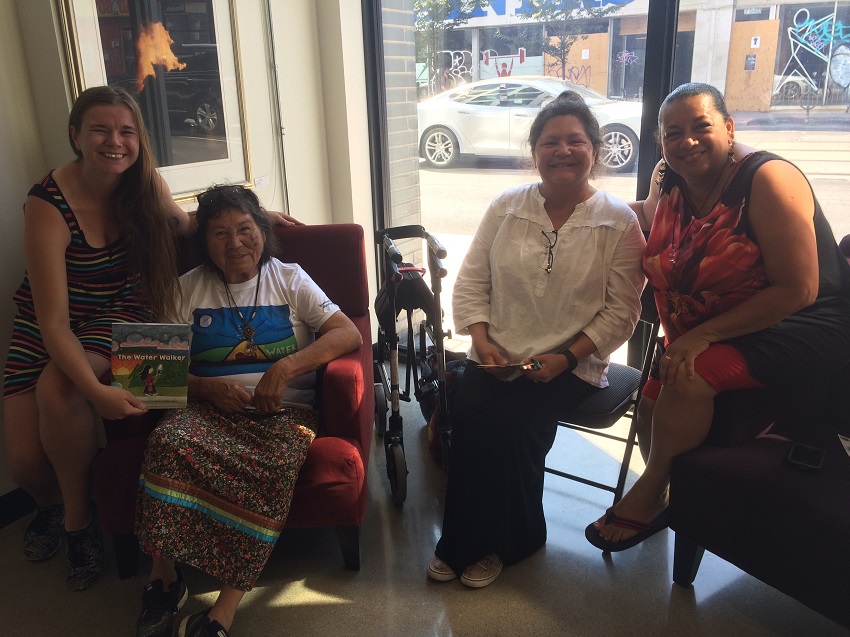Water research may not the first thing people associate with the University of Toronto’s Faculty of Kinesiology and Physical Education, but as graduate student Stephanie Woodworth sees it, nothing could be more related.
“If we think about the human body as being 70 percent made up of water, that alone should be enough reason to study water in order to understand the active human body.”
But, Woodworth’s interest in water goes far beyond. She is interested in exploring the inequities with water security in Canada and how it shapes our movement and lives.
“Access to safe, clean water determines how we're able to move, where we're moving, why we're moving and if we're moving. It ultimately shapes our entire lives,” says Woodworth, who is in her second year of a master’s degree in exercise sciences at KPE.
She is focusing her research on the Anishinawbe Water Walks, a movement initiated in 2003 by two Anishinawbe Grandmothers, who started walking the perimeter of the Great Lakes to raise awareness about the importance of preserving clean water from pollution.
“We talk about increasing sport and physical activity participation in the North, but we’re not taking into account that a lot of these communities don’t have access to drinking water,” she says. “So, how are they supposed to participate in sport and physical activity when they don’t have access to life’s basic necessity?”
Woodworth points to the similarities in the Global South where ‘imported’ sport for development initiatives often fail because they overlook the realities of the people living there. This spring, she will have a chance to discuss these issues first hand as one of two Canadian youth ambassadors invited to attend the International World Water Forum in Brazil.
The Forum is the biggest water related event organized by the World Water Council to promote awareness, build political commitment and trigger action on critical water issues. Prior to attending the Forum, Woodworth will be joining 70 youth from 50 countries at the World Youth Parliament for Water, a youth network acting for water.
“We’re all going to be working together to share ideas and resources for actions we can all take collectively within our communities and further,” she says.
So far, Woodworth has already made a significant contribution. She co-wrote a children’s book called Canada’s Great Water Adventure to inspire children to take an interest in water and outdoor adventure. The book follows the adventures of Fernando, an exchange student from Brazil, and Brooke, a young Canadian whose family is hosting Fernando, as they visit each Canadian province and territory to learn about Canada’s diverse history, its waterways, and water’s impact on livelihood and well-being.
 Stephanie Woodworth (left) poses at the book launch for The Water Walker with co-author and illustrator Joanne Robertson, Grandmother Josephine Mandamin and Grandmother Kim Wheatley. Photo credit: Stephanie Woodworth
Stephanie Woodworth (left) poses at the book launch for The Water Walker with co-author and illustrator Joanne Robertson, Grandmother Josephine Mandamin and Grandmother Kim Wheatley. Photo credit: Stephanie Woodworth
So, what’s next for this prolific student? Woodworth’s hope is to continue expanding her understanding of water security in North America with a PhD degree in human geography, so that she can continue to raise awareness about the importance of protecting water and the inequities of water access in Canada.
“But, most importantly, I want to continue building relationships between people on water to show that we all have water bodies and that we’re all connected to bodies of water. I want to expose those connections and strengthen them, so that we're all water stewards and protectors,” she says.
For those wondering about her transition from kinesiology to geography, Woodworth again points out the obvious connection.
“Physical cultural studies in kinesiology examine the power relations that are created and reproduced through the spaces in which bodies exist, so my integration into human geography will be expanding my analysis of space, and bodies and space.”
“I think it's really important that we have these diversities of subject matter,” says Caroline Fusco, associate professor at KPE and Woodworth’s supervisor. “Stephanie’s study doesn’t just address water and indigeneity, but also women, who are the keepers of water. The fact that she could rely on our Faculty’s expertise, while also taking courses with Eve Tuck, associate professor of critical race and Indigenous studies at OISE, and Bonnie McElhinny, associate professor in anthropology, is a testament to the wealth of scholars working on social justice issues at U of T.”
